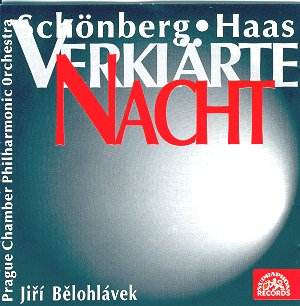 |
ARNOLD SCHOENBERG Verklärte Nacht PAVEL HAAS Study for string Orchestra (1943) Overture for Radio Op 11 (1931) Psalm 29 Op 12 (1932) Viktor Bycek, Jiri Tomaschko tenors Jaromir Belor baritone Vratislav Vinicky bass Dalibor Tolas baritone Bambini di Praga New Czech Chamber Orchestra Prague Chamber Philharmonic Orchestra Jiri Belohlavek conductor Rec: Domovina Studios and the Rudolfinum, Prague 1994 |
| AmazonUK AmazonUS Amazon recommendations | |
The justification for the coupling of these two composers is advanced by the sleeve note writer as one of transfiguration - literally so in Verklärte Nacht, figuratively in the case of Haas, who wrote his Study for String Orchestra whilst incarcerated in Terezin.
It is a lean argument at best, meaningless at worst. Haas' aesthetic owes little if anything to Schoenberg, even to the Schoenberg of Verklärte Nacht and the special pleading involved in this disc does no service at all to Haas; it is absurd to see in Haas' 1932 setting of Psalm 29 some prefiguring of the European cataclysm to come and to vest in this work a significance it does not possess. Furthermore the misplaced sentimentality of the sleeve notes serves only to devalue the work as a setting in its own terms; the "unimaginable suffering and pain" adduced to Haas is more properly to be located less in Prague in 1932 than to Auschwitz in 1944.
Haas is too important a composer to need this nonsense. The Study for String Orchestra employs rhythmical patterns, syncopation, time signature changes and changes of tempo and internal divisions of the string sections which are of galvanizing intensity. First conducted in Terezin by Ancerl it was filmed as a propaganda exercise and the film still exists; the score though was lost and, though the notes make no mention of it, I believe that Ancerl helped Lubomir Peduzzi reconstruct it from the parts which survived (the bass parts had been lost).
The Overture for Radio is a jaunty and frivolous work. From its pizzicato opening, exuberant woodwind writing leads to decisively Janacekian influences - Haas absorbed a huge amount from the Brno Janacek master classes - and the piquant orchestral resources include piano and an insistent drum tattoo. Reciters and singers add a touch of stentorian absurdity to the proceedings and the work does veer close to a strange amalgam of Moravian cabaret - Janacek meets Kurt Weill.
The Psalm 29 setting is in two parts - an introduction and the setting itself. A tolling bell introduces the remarkable organ part - no player is listed in Supraphon's notes, which is discourtesy itself. Involved fugal writing, compressed and satisfying, evokes a determined but never grim atmosphere. The Psalm brings from Haas augmented brass writing and a processional, which is the fitting stage for the boys' voices and for Dalibor Tolas' declamatory unfolding of the protective sentiments of the psalm. It expands in amplitude and significance to a sweeping finale; if elsewhere Haas' stylistic leanings were lighter here the climax is nothing less than a Janacek - Mussoursgky blockbuster.
Verklärte Nacht receives a decent performance from the New Czech Chamber Orchestra but it never quite resolves and coheres as it should; one feels a want of conviction. Elsewhere the playing is good, and Belohlavek directs the disparate forces well.
I can't help but feel that the yoking together of Schoenberg and Haas is a mistake and the disc, for all its virtues, will suffer as a result. Well-meaning but unconvincing notes; no texts; no translations. A missed opportunity.
Jonathan Woolf